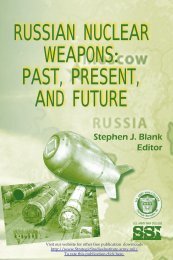The United States and China in Power Transition - Strategic Studies ...
The United States and China in Power Transition - Strategic Studies ...
The United States and China in Power Transition - Strategic Studies ...
You also want an ePaper? Increase the reach of your titles
YUMPU automatically turns print PDFs into web optimized ePapers that Google loves.
the “One-<strong>Ch<strong>in</strong>a</strong>” pr<strong>in</strong>ciple, which is <strong>Ch<strong>in</strong>a</strong>’s moststressed<br />
item, is not a treaty-bound U.S. commitment<br />
at all. <strong>The</strong> Taiwan Relations Act of 1979, however, is<br />
a U.S. public law. No matter how strongly <strong>Ch<strong>in</strong>a</strong> opposes<br />
it, every U.S. President has to follow the law to<br />
h<strong>and</strong>le U.S. relations with Taiwan, whether they like<br />
it or not.<br />
Moreover, there is plenty of ambiguity <strong>in</strong> those<br />
documents. Taiwan’s pro-<strong>in</strong>dependence forces look<br />
to the TRA as their source of U.S. support because of<br />
its strong pro-Taiwan positions <strong>and</strong> push the Taiwan<br />
<strong>in</strong>dependence agenda to the br<strong>in</strong>k from time to time<br />
with the expectation that the <strong>United</strong> <strong>States</strong> will eventually<br />
back them up.<br />
<strong>Ch<strong>in</strong>a</strong>, however, <strong>in</strong>sists that the <strong>United</strong> <strong>States</strong><br />
would honor the One-<strong>Ch<strong>in</strong>a</strong> pr<strong>in</strong>ciple <strong>and</strong> reacts<br />
strongly to Taiwan’s pro-<strong>in</strong>dependence moves with<br />
the expectation that the <strong>United</strong> <strong>States</strong> will not <strong>in</strong>tervene.<br />
<strong>The</strong> <strong>United</strong> <strong>States</strong> for some time relied on this<br />
“strategic ambiguity” to ma<strong>in</strong>ta<strong>in</strong> a delicate balance<br />
between the two sides across the Taiwan Strait. However,<br />
the recurrent tension <strong>in</strong> this area has forced the<br />
<strong>United</strong> <strong>States</strong> to rush to the rescue from time to time.<br />
This so-called strategic ambiguity eventually fell out<br />
of favor dur<strong>in</strong>g George W. Bush’s terms <strong>in</strong> the White<br />
House. In 2001, <strong>in</strong> the aftermath of the U.S.-<strong>Ch<strong>in</strong>a</strong><br />
military airplane collision <strong>in</strong>cident, President Bush<br />
categorically put it that “the <strong>United</strong> <strong>States</strong> would do<br />
whatever it takes to help Taiwan defend itself.” 78 Yet<br />
<strong>in</strong> 2003, the President, while hav<strong>in</strong>g a meet<strong>in</strong>g with<br />
the Ch<strong>in</strong>ese Premier Wen Jiabao at the White House,<br />
responded to a question from the press that he would<br />
not want Taiwan to make trouble. 79 In other words,<br />
the <strong>United</strong> <strong>States</strong> made it clear that if Taiwan pro-<br />
113

















